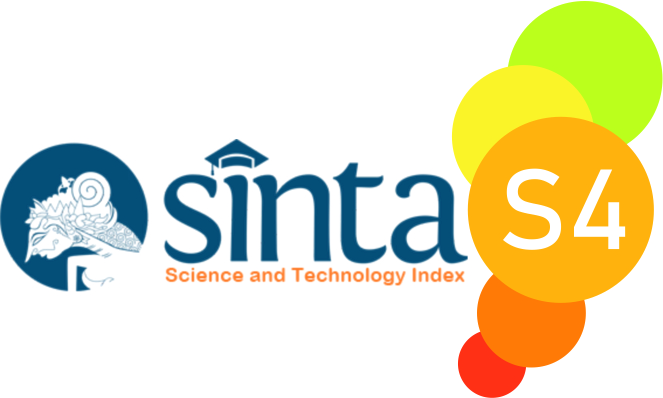The Use of Board Games for EFL Learning
Teacher’s Perspective
Abstract
Nowadays, digital-based media-integrated is needed in the learning context. This study aims to find out the teacher's perspective on the use of board games as a for EFL learning. This research used a descriptive qualitative approach with an in-depth interview instrument. The participant was one English teacher in a private Junior High School in Malang Regency. The data was displayed descriptively. With the advent of digital technology, the result showed that board game still have various benefits. By using board games, teacher motivate students and make the learning process understandable. Board games are also an effective teaching media for improving motivation in learning English. Board games increase student participation, motivation, and enjoyment, making learning more efficient and fun. It is showed that board games improve students' scores in English class. The board game showed that students were more active during English learning. It is concluded that board games improve students' ability to learn English. Thus, it is recommended that board games be used as a learning media for EFL learning.
References
Aksa, M. (2017). Classification and Characteristics of Historical Learning Media. https://doi.org/10.2991/ictte-17.2017.1
Aminatun, D. (2019). ICT in University: How Lecturers Embrace Technology for Teaching. Jurnal Smart, 5(2), 71–80. https://doi.org/10.26638/js.815.203X
Annisa, P. S. M., & Nst, R. D. (2020). Comic Strips And Board Game As A Media In Learning Oral Language Skills For Students. Jurnal Darma Agung, 28(2), 313. https://doi.org/10.46930/ojsuda.v28i2.653
Castillo-Cuesta, L. (2020). Using Digital Games for Enhancing EFL Grammar and Vocabulary in Higher Education. International Journal of Emerging Technologies in Learning, 15(20), 116–129. https://doi.org/10.3991/ijet.v15i20.16159
Chotimah, C., & Astiyandha, T. (2022). Improving Students’ Vocabulary Knowledge Through Race To The Board Game For Esp (English For Specific Purposes). Lingua, 18(2), 241–251. https://doi.org/10.34005/lingua.v18i2.2264
Creswell, J. W. (2012). Educational Research: Planning, Conducting, and Evaluating Quantitative and Qualitative Research (4th ed.). Pearson.
Dewi, R., & Verawati, I. (2022). The Effect of Manipulative Games to Improve Fundamental Motor Skills in Elementary School Students. International Journal of Education in Mathematics, Science and Technology, 10(1), 24–37. https://doi.org/10.46328/ijemst.2163
Fuad, I., Rofiah, S., & Arini, W. (2023). Developing Scrabble Game to Teach English Vocabulary for Elementary School. Journey: Journal of English Language and Pedagogy, 6(2), 478–486. https://doi.org/10.33503/journey.v6i2.3216
Gagne, R. M. (2013). Instructional Technology (R. M. Gagne, Ed.). Routledge. https://doi.org/10.4324/9781315060248
Hasyim, A., & Hayati, N. A. (2023). Analisis Kemampuan Guru dalam Menggunakan E-Learning sebagai Media Pembelajaran di Era Digital. Ideguru: Jurnal Karya Ilmiah Guru, 8(2), 297–303. https://doi.org/10.51169/ideguru.v8i2.555
Jadi, A. M. (2019). Improving The Communication For Children With Speech Disorders Using The Smart Toys. International Journal of Artificial Intelligence & Applications, 10(03), 25–40. https://doi.org/10.5121/ijaia.2019.10303
Kasanah, U., Zaini, M., Efendi, N., Wijayanto, A., & Setyowati, E. (2022). Development of Smart Snake and Ladder Media in Mastery of English Vocabulary Grade III at SDI Babussalam Pandean Durenan Trenggalek. Journal Corner of Education, Linguistics, and Literature, 1(4), 216–226. https://doi.org/10.54012/jcell.v1i4.45
Kong, Y. (2021). The Role of Experiential Learning on Students’ Motivation and Classroom Engagement. Frontiers in Psychology, 12. https://doi.org/10.3389/fpsyg.2021.771272
Li, C.-T., Hou, H.-T., & Lee, L.-H. (2022). Design of a dual-hierarchy scaffolding board game-based learning activity for EFL reading comprehension. Language Teaching Research, 136216882211259. https://doi.org/10.1177/13621688221125903
Madayani, N. S., & Muhassin, M. (2020). Exploring Perception of EFL Teachers towards Use of Media in Teaching English. IJOLTL (Indonesian Journal of Language Teaching and Linguistics), 5(1), 29–44. https://doi.org/10.30957/ijoltl.v5i1.613
McKenney, S., & Visscher, A. J. (2019). Technology for teacher learning and performance. Technology, Pedagogy and Education, 28(2), 129–132. https://doi.org/10.1080/1475939X.2019.1600859
O’neill, D. K., & Holmes, P. E. (2022). The Power of Board Games for Multidomain Learning in Young Children •.
Puspitarini, D. (2022). Blended Learning sebagai Model Pembelajaran Abad 21. Ideguru: Jurnal Karya Ilmiah Guru, 7(1). https://doi.org/10.51169/ideguru.v7i1.307
Savitri, M. N., & Suwarso, P. N. (2023). Teachers’ Perspective Of Ict Integration On Elt. English Journal, 17(1), 13–22. https://doi.org/10.32832/english.v17i1.13796
Selvaraj, A., Radhin, V., KA, N., Benson, N., & Mathew, A. J. (2021). Effect Of Pandemic Based Online Education On Teaching And Learning System. International Journal of Educational Development, 85, 102444. https://doi.org/10.1016/j.ijedudev.2021.102444
Suryadi, A., Darmawan, D., Rahadian, D., Wahyudin, D., & Riyana, C. (2022). Pengembangan Aplikasi Sistem Database Virtual Community Digital Learning Nusantara (VCDLN) Menggunakan Model Waterfall Dan Pemrograman Terstruktur. Jurnal Petik, 8(1), 48–56. https://doi.org/10.31980/jpetik.v8i1.1424
Syakur, M. A. (2020). The Use Of Board Game In Teaching Speaking To Young Learners. English Education : Journal of English Teaching and Research, 5(2), 149–teacher155. https://doi.org/10.29407/jetar.v5i2.14633
Varas, D., Santana, M., Nussbaum, M., Claro, S., & Imbarack, P. (2023). Teachers’ strategies and challenges in teaching 21st century skills: Little common understanding. Thinking Skills and Creativity, 48, 101289. https://doi.org/10.1016/j.tsc.2023.101289
Venker, C. E., & Johnson, J. R. (2022). Electronic Toys Decrease the Quantity and Lexical Diversity of Spoken Language Produced by Children With Autism Spectrum Disorder and Age-Matched Children With Typical Development. Frontiers in Psychology, 13. https://doi.org/10.3389/fpsyg.2022.929589
Copyright (c) 2024 Magfirotul Lailia, Pratnyawati Nuridi Suwarso, Iswahyuni Iswahyuni

This work is licensed under a Creative Commons Attribution-ShareAlike 4.0 International License.

Journey: Journal of English Language and Pedagogy by http://ejurnal.budiutomomalang.ac.id/index.php/journey/index is licensed under a Creative Commons Attribution-ShareAlike 4.0 International License.






